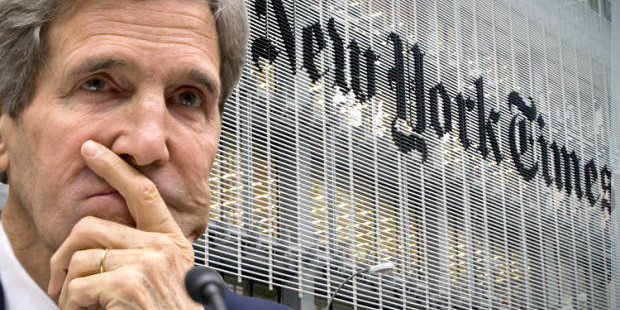
From bad to worse to delusional: The real story about Syria that the New York Times won’t tell you
The Times’ coverage of anything that challenges the mythology of American primacy just gets worse
Forgetting, not paying attention and feeling as opposed to thinking are, of course, acts of patriotism in our great nation. Let us, then, do the un-American thing together as we consider the just-agreed plan to end the violence in Syria and send its people into a post-crisis future.
The U.N. Security Council, as last weekend’s headlines announced, passed a resolution Friday providing for a settlement in Syria and—important to note—the sequence in which steps are to be taken. No one assumes these things can get done easily, and some of those involved doubt they ever will be. But there is a goal all agree on now, and this counts no matter the difficulties ahead.
In brief, the U.N. resolution calls for a cease-fire binding all parties to the conflict with the exceptions so far of the Islamic State and al Nusra, the Syrian offshoot of al-Qaida. By implication, these are now identified as the common enemies of all those to be bound by the peace pact. Following the cease-fire, there is to be what we used to call an all-parties conference—talks between the Assad government in Damascus and all its various adversaries—armed, unarmed, exiled, jailed. Jordan is now tasked with making a list of those groups deemed to be terrorists; once there is agreement on the list, they, too, will join the excluded.
Then come negotiations on a constitutional rewrite that addresses the sources of the current conflict. In my read it is to include new political provisions, possibly to decentralize power, and others to accommodate ethnic and religious divisions among Syria’s 23 million people. There will also be guarantees that Syria remains (as it is now) a secular state.
Last are national elections. Elections do not always certify democratic process as Americans pretend them to, but Syria’s are to be internationally supervised, and the scrutiny is certain to be extremely close.
Do not miss this, finally: The U.N. resolution makes no mention of President Assad. There is no stipulation that he is to step down, or aside, or do anything else as a precondition of a settlement. Syrians are left to determine for themselves what place, if any, Assad has in their future political formations.
Recognize any of this? Readers of this column should. These provisions vary little from a settlement plan Sergei Lavrov put on the table in Vienna last October, when a new round of talks among more than a dozen of the Russian foreign minister’s counterparts began.
On the other hand, readers of our corporate media, notably the New York Times, will be terribly confused at this point. They have been reading for some time that the U.N. resolution last Friday in New York was the consequence of Secretary of State Kerry’s arduous diplomacy. Facts being facts, the record the record, and history being history, this takes a lot of forgetting.
I have watched my favorite daily carefully in the weeks since the Vienna process, as the talks on Syria are termed, have proceeded. At the pace of crabgrass across a lawn, its correspondents have cautiously but stealthily corrupted the narrative. Washington’s reckless, anti-democratic insistence that Assad must be pushed from power in a coup before Syrians can have any say in their future leadership disappeared maybe two or three weeks ago. Now we get spongy writing such as this, from last Wednesday’s paper:
“The United States,” Mr. Kerry said, “was not seeking Mr. Assad’s ouster per se, but rather considers it unlikely that he can preside over a successful settlement.”
I love the “per se,” since ousting Assad per se has been explicit American policy for years. If you can explain in the comment box what the rest of the sentence means, please do. You are a better reader than I.
Ten days ago, the inimitable Michael Gordon, the Times’ State Department correspondent, broke the ice decisively, when he referred to “Mr. Kerry’s plan,” and then recited each of the provisions described above. That is to say, he described Lavrov’s plan.
With the U.N. resolution passed as of last Friday, David Sanger and Somini Sengupta gave us this over the weekend:
“Friday’s plan is the outcome of what Secretary of State John Kerry tells his administration colleagues was part of a three-month-long ‘force feeding’ of a diplomatic process.”
The Times’ coverage of anything that challenges the mythology of American primacy goes from bad to worse to delusional.
We have witnessed a force-feeding over the past three months all right, but forget about whatever Kerry has been telling colleagues—and you by way of correspondents who behave like clerks attending to the State Department’s bulletin board. Turning things upside down as one often must, Russia—with France’s assistance post-Paris—has patiently forced the U.S. to abandon its obsession with toppling Assad, accept settlement terms based on the principle of self-determination and put the threat of the Islamic State before great-power advantage, as it should have more than a year ago.

